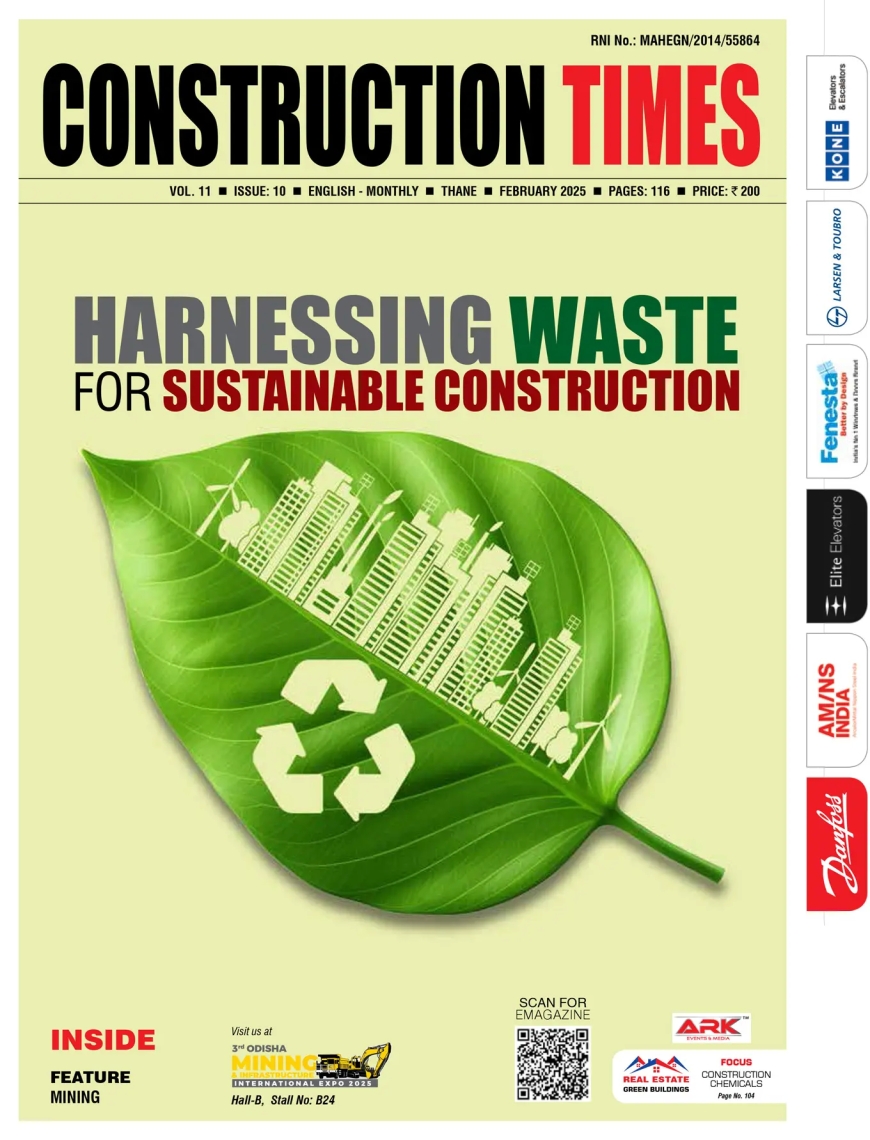Dispute Resolution - Critical Role of Solution-Oriented Approach.
The authors highlight the challenges faced and resolution ahead for the road construction industry to deal with the aftermath of the pandemic. The construction industry is the second largest industry in the country after agriculture. It makes a significant contribution to the national economy and provides employment to a large number of



The authors highlight the challenges faced and resolution ahead for the road construction industry to deal with the aftermath of the pandemic.
The construction industry is the second largest industry in the country after agriculture. It makes a significant contribution to the national economy and provides employment to a large number of people. In its path of advancement, the industry has to overcome a number of challenges. The conflicts and disputes are mainly due to an uncertain environment and the complex nature of projects in the industry. Such disputes result in delays in project implementation, increase in cost, and loss of revenue due to investments getting stuck in the dispute resolution process. There has been an influx of disputes and challenges in the aftermath of the pandemic. This solution-oriented approach is quite essential for the development of the industry.
Legal Hurdles
The aftermath of the pandemic has not only decreased the liquidity and viability of the businesses but has also created various stumbling blocks for the industry. An attempt is made to highlight such roadblocks which might come in the way of development of the construction industry:-
- Delay in adjudication of the pending cases;
- Increase in the number of labour disputes due to revenue loss because of pandemic
- Force Majeure clause as an escape route for delay in payments of contractors
- Non-recovery of dues from the vendors/operational creditors due to suspension of insolvency proceedings
- Non- payment of statutory dues and,
- Lack of effective trials in pending arbitrations due to video conferencing, as a result of the pandemic
Government's Initiatives
In order to deal with the aftermath, the government has also taken various steps to bring stability and liquidity in the industry. Some of these steps are detailed below:-
- National highway projects were unimpeded by the outbreak of Covid-19. Various new road contracts were awarded through the course of the pandemic, to ease the financial difficulties of developers and contractors by ensuring that work continued smoothly.
- National Highway Authority of India (NHAI) in a positive decision decided to de-scope the pending right of way without reducing construction period for highway developers working on BOT-HAM projects so as to make the process smoother. NHAI issued a standard operating procedure (SOP) pertaining to the approach towards de-scoping the pending right of way (ROW) for BOT(build, operate, transfer) HAM projects.
- The National Highways Authority of India (NHAI) awarded the highest length of projects during the months of April to August of financial year 2020-21, as compared to the projects awarded during the same period in the last three years.
- Despite lockdown and the prevailing situation, NHAI took various initiatives to instil confidence in the bidders of the sector. To ease the liquidity crunch and ensure cash flow to the contractors, NHAI ensured that no payments are delayed due to closure of offices and disbursed Rs 10,000 crore during lockdown in March 2020 using digital platforms.
- In another tryst with technology to cut lengthy administrative processes while bringing better transparency, NHAI is set to become the country's first government backed construction sector organisation to go 'fully digital' with cloud-based Data Lake Software. The road construction company plans to deploy software that will not just track files but will also pin-point officials behind delays in disposing of matters. The move is also likely to enhance efficiency and transparency at NHAI.
- The highways ministry extended the duration of a liquidity-related relaxation provided to road project contractors in response to Covid-19 that enabled monthly payments for work done till 30th June 2020.
- A relief package for road contractors and concessionaires was also announced to help them overcome the impact of Covid-19 outbreak. The measures included extension of project timelines between three to six months and payments to subcontractors via an escrow account.
In another welcome step, Delhi High Court recently in case titled 'Skylark Infra Engineering Pvt Ltd v National Highways Authority of India & Anr' ordered the status quo be maintained in respect of the bank guarantees and other securities in dispute during the pandemic. Therefore, these decisions taken by Judiciary and Legislature, are definitely a boon for the industry. However, more practical steps that can be taken to smoothen the dispute resolution process for the industry is discussed hereinafter.
Solution-Oriented Approach
During these testing times for the industry, it is critical to focus on a solution-oriented approach that can ease the process of dispute resolution. Arbitration as a dispute resolution mechanism has always been a favoured resolution method to solve the complexities in this sector. Such complexities emerge due to the involvement of multiple parties, high stakes in the projects, calculation and determination of amount of compensation, analysis, assessment and review of huge amounts of data and the requirement of involvement of technical experts for the resolution of disputes. It is paramount to identify the challenges derived from the 'new normal' with relation to social distancing and its impact on court, arbitration, mediation and dispute board proceedings. This will minimize the number of disputes in this sector for speedy development of infrastructure.
Few Takeaways
- The first, immediately apparent impact of Covid-19 on construction projects is the delay and disruption of project activities, which will inevitably lead to contractors' claims for additional time and costs. To ensure their entitlement to an extension of time and/or losses suffered, contractors should make sure timely submission of their requests for an extension of time, respecting the procedural requirements as listed in their respective contracts.
- Transparent and detailed documentation is the backbone of resolving disputes. To deal with the influx of disputes, it is necessary to ensure that the contractors have their documents in order.
- A distinction must be made between the claims which are completely document based and those which requires oral evidences. In arbitrations which are completely based on documents, parties must resort to trial by documentary evidences. This will not only hasten the adjudication of the claims but would also enable the parties to get their arbitrations awards enforced.
- Another, perhaps even more significant, consequence of the global pandemic caused by Covid-19 is that certain contractors are or will be forced to suspend their works entirely or, in the worst-case scenario, to terminate their contracts. Typically, force majeure events relate to events which are outside of parties' reasonable control, preventing a party from performing its contractual obligations. The primary consequence of invoking force majeure is that the contractor is entitled to suspend performance of its contractual obligations for the time period of the force majeure event. It is important, however, that the contractor provides timely notice of the force majeure event to the employer, at the moment when it became aware, or should have become aware, of the relevant event constituting force majeure, as this is typically one of the requirements under most construction contracts.
- Also, it is important that the new commercial contracts are drafted carefully particularly the clause of force majeure. The clause of force majeure should be exhaustive enough to cover any pandemic like that of Covid-19.
Force-Majeure Clauses in Pre-covid Contracts: Its Impact
Another issue of consideration for the industry is the effect of force majeure clauses in the existing contracts entered into prior to the pandemic. Whether the outbreak of Covid-19 and the ensuing lockdowns ordered by the central and state government would be sufficient to invoke the force majeure clause in the contract would depend on the following factors:
- Establishing the causal connection between the force majeure event and hindrance to the performance of the contract
- Harmonious construction with all the provisions; and
- Compliance with the condition precedents contained in the force majeure clause.
Government of India vide its Memo No. F. 18/4/2020 PPD dated 19-02-2020 issued by the Deputy Secretary of Govt. of India, Ministry of Finance stated as follows:
“A doubt has arisen if the disruption of the supply chains due to spread of corona virus in China or any other country will be covered in force majeure clauses. In this regard it is clarified that it should be considered as a case of natural calamity and the force majeure clause may be invoked whenever considered appropriate, following due procedure.”
The pertinent point is that this memo gives rise to force majeure in respect of contracts dependent on supply chains, however the courts may not apply the same principles in all commercial contracts. Therefore, the questions which shall be considered by judiciary are
- Whether there lies a force majeure clause in the contract in question or not; and
- Whether this pandemic has affected the fundamental basis of the contract.
The courts will have to ascertain whether the contract has become impossible to perform and whether the doctrine of frustration of contract could be made applicable to such a contract. Of course, in such events, the courts and arbitrators will have to evaluate and decide each dispute on individual merits, which would be based on the terms of the contract, the intent of the parties and steps taken to mitigate it.
Conclusion
The concerns and practical difficulties that have arisen with the times require taking of positive steps to deal with the aftermath. The various roadblocks that still persist in the way of resolution should be tackled with a more crystallized procedure, be it time-consuming litigations or the threat of coercive action post the resolution process.
1https://www.livemint.com/news/india/covid-has-no-impact-on-highways-sector-gadkari-at-htls-11606490997303.html;
2https://auto.economictimes.indiatimes.com/news/industry/nhai-decision-to-descope-pending-row-without-reducing-construction-period-positive-for-developers-icra/77118366; 3https://www.hindustantimes.com/india-news/highest-highway-length-in-3-years-awarded-during-covid-19-pandemic-nhai/story-GbAe3xmkZQs9TNT2IWnIBM.html; 4Liquidity-related relaxation to road contractors extend till June end, Auto News, ET Auto (indiatimes.com); 5W.P.(C) 3668/2020, Delhi High Court.
Hits: 425
















